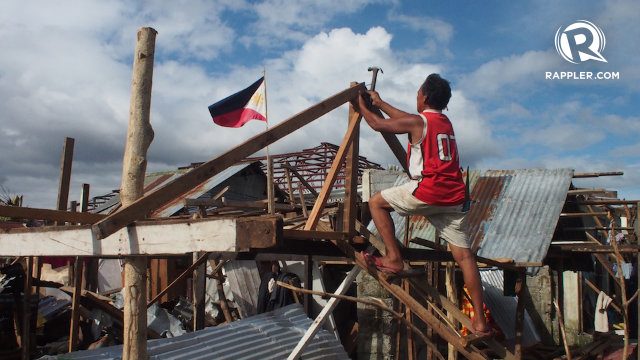SUMMARY
This is AI generated summarization, which may have errors. For context, always refer to the full article.

MANILA, Philippines – The government assigned more than 500 personnel, most of them first-timers, to help produce a report that has delayed rehabilitation efforts 6 months after Super Typhoon Yolanda (Haiyan).
The problem of inexperience doesn’t end there. Suffering the lack of a permanent structure, the government needs to train new people again for every disaster.
These issues surfaced in a joint congressional hearing on Wednesday, May 14, as Senator Francis “Chiz” Escudero grilled a defense official about a perceived delay in the post-disaster needs assessment (PDNA), a requirement in producing a master rehabilitation plan. (READ: Yolanda rehab: 2 Cabinet clusters still delinquent)
Escudero asked Defense Undersecretary Eduardo Batac if it indeed takes 6 months to produce a PDNA.
Batac said based on experience, “on the average, it really takes us 6 months.”
“Just to give you a background,” he told Escudero, 7 teams or 536 personnel “were deployed for the purpose, for the different affected areas.”
He explained: “We usually don’t have personnel ready for this, and these same personnel that are organized for the purpose had to go through training. And we spent, in our timeline, some time for training also, some time in December.”
He said this training “took us only about one week.”
‘There’s no permanency’
Batac revealed these as the government drew criticism for failing to produce a rehabilitation plan 6 months after Yolanda. Rehabilitation Secretary Panfilo Lacson blamed this on delayed PDNAs – a problem compounded by too much bureaucracy and too little authority.
Escudero complained about the delayed PDNAs, too, during the congressional hearing.
He pointed out that Congress allocated more than P100 billion to rebuild affected areas, but “as of this day, we have only spent in the 2014 budget less than P4 billion.” This is “because according to all of the agencies we invited, they are all waiting for your PDNA.”
The problem goes beyond Yolanda, however.
Escudero asked Batac, “So we train new field workers each time there is a disaster?”
Batac admitted “there’s no permanency” when it comes to those producing disaster risk-reduction requirements “and even the PDNA.” “We’re lucky if there’s a permanence even on the local government unit,” the defense official said.
Problematic set-up
Escudero shot back, “So you mean to say each time a disaster hits us, since there is no permanent group, as you said, you train new people all over again to do the work?”
Batac said “we have to.” This is “just to make sure that they are familiar with the protocol.”
He added, “There are people who have done it before, but usually there are more people who are new.”
Experts see a problem with the current set-up.
To ensure permanence, Ateneo School of Government Dean Tony La Viña stressed the need for a standalone agency that focuses on disasters. (READ: Rehab czar pushes for disaster agency)
The delay in rehabilitation after Yolanda, he added, is inevitable because the system “is designed for small, localized disasters but not for massive disasters.”
“It’s easy to do a PDNA for a town or a barangay, but not for a whole province or many provinces all at once,” La Viña explained.
He said the current set-up threatens rehabilitation efforts after Yolanda.
La Viña told Rappler, “We are failing.” – Rappler.com
Add a comment
How does this make you feel?
There are no comments yet. Add your comment to start the conversation.